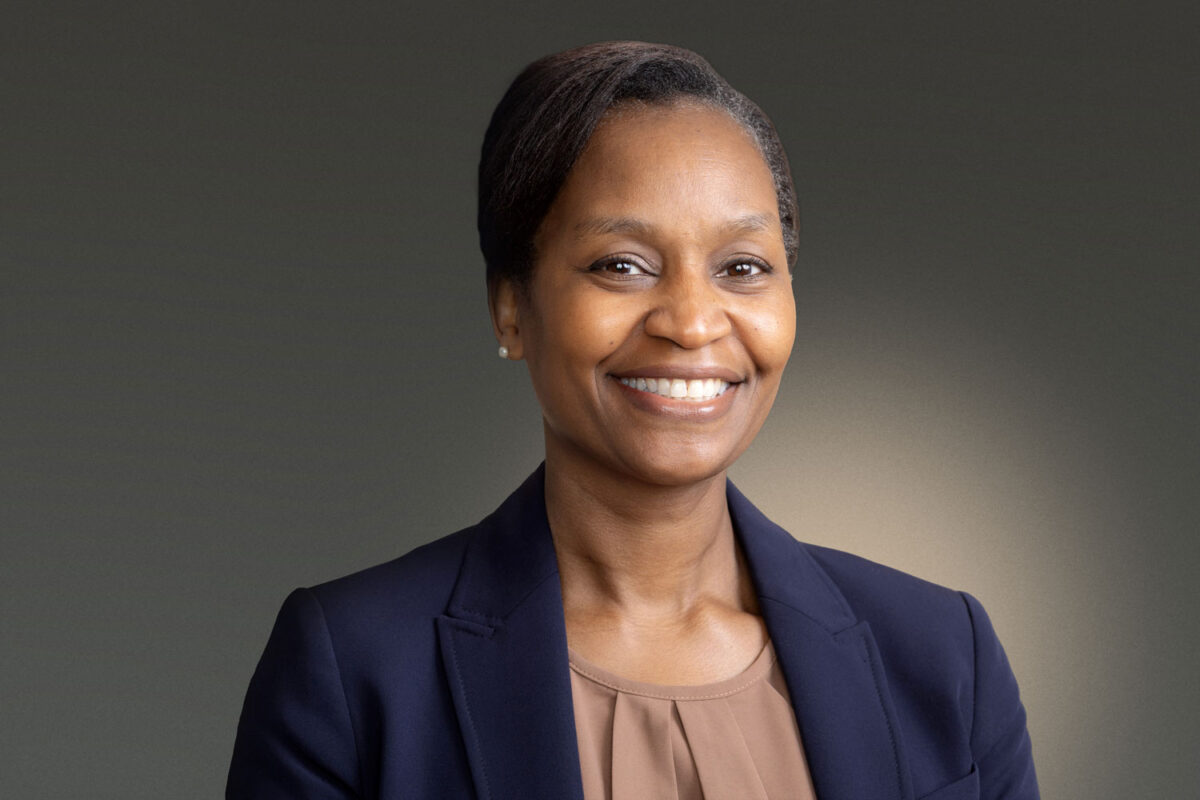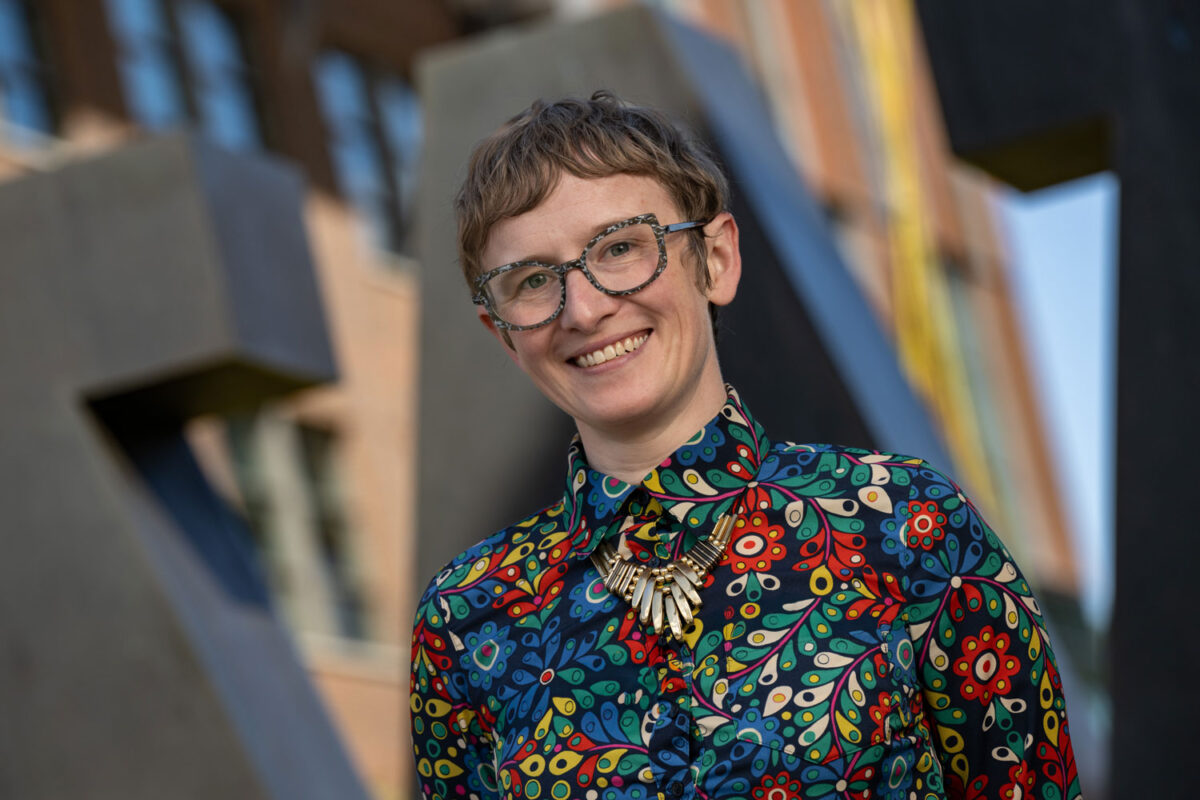The mark of a good teacher is one who educates students on what they need to pass a class and succeed in their academic life, but the mark of a great teacher is one whose teachings leave a lasting, even lifelong impression on their students. These educators not only share lessons but also create a legacy.
Each year, the University of Washington Alumni Association recognizes one teacher who inspires and influences their students long after they left their classroom. The 2024 Distinguished Teaching Legacy Award recipient is Dr. Shauna Elbers Carlisle, associate professor in UW Bothell’s School of Interdisciplinary Arts & Sciences.
Past students can nominate former teachers who they feel have made a profound impact on them. For Carlisle’s nominators, it wasn’t just a class or subject matter that has left a lasting impression of their former instructor. Rather, it is the way she encourages and supports them as a mentor and as a role model.
“I’m so honored,” Carlisle said. “I was very surprised, shocked even, because I teach statistics, and it’s no one’s favorite class. But I think it’s about more than the material. Everyone just needs someone in their corner, a sponsor who opens doors and who sees your potential.
“Everyone just needs an opportunity.”
An active role model
Among Carlisle’s nominators is 2017 alumna Asiya Abdul-Ali, who graduated with a master’s in Policy Studies. Carlisle was her statistics professor, her capstone adviser and her research mentor.
“Dr. Carlisle is an amazing educator and truly a role model, especially for me as a Black woman. I was so excited to have someone who looked like me as my instructor,” she said. “She believed in me and helped me realize that statistics was not as intimidating as it seemed. She pushed me because she knew my potential.”
For her capstone project, Abdul-Ali researched the effectiveness of the Detention Risk Assessment Instrument, a tool that determines where youth should be placed when arrested — and that was being used at the Denny Juvenile Justice Center in Everett, Washington.
“Dr. Carlisle dedicated a lot of time to ensuring that we completed a project that would demonstrate who we were as researchers. I felt like she was an active participant in my capstone journey, and that meant a lot to me,” Abdul-Ali said. “I truly believe she has made a big impact in my life, and I value the time I got to learn from her. She is inspiring, and I am happy to say we still keep in touch.”
Currently, Abdul-Ali works as a health educator at Metro Health in Columbus, Ohio, where she promotes education for the prevention of sexually transmitted infections, with an emphasis on HIV/HCV testing. She is also a doctoral candidate in Healthcare Administration at Franklin University.
“Every day, I use the skills I learned under Dr. Carlisle’s guidance,” she said.
An indispensable mentor
At the center of Carlisle’s work as a researcher has been RHealth, a research group focused on racial disparities in health for which Carlisle is the principal investigator. Through this group, she often recruits students from her classes, particularly students from the same demographics she researches — students such as Marjan Didra, an alumna with a bachelor’s in Gender, Women & Sexuality Studies (’18) and a master’s in Policy Studies (’19).
“As an immigrant woman from Iran, this topic deeply resonated with me as I have witnessed firsthand the challenges faced by marginalized communities in accessing equitable health care,” Didra said. “The research provided an opportunity to delve into issues close to my heart and aligned with my personal experiences and aspirations.”
This research aided her professionally, as well, providing a real-world application for the theoretical learning of the class, preparing her for future challenges in public health research.
Didra also credits Carlisle’s guidance for her decision to pursue a doctorate in Educational Policy, Organization and Leadership at the UW in Seattle.
“Dr. Carlisle’s support and inclusion of students like me was a testament to the power of invested professors. Her encouragement and motivation were pivotal in my decision to pursue further education in a doctorate program,” she said. “Even years after my graduation from UW Bothell, her continuous support was a cornerstone of my academic and professional development. Her commitment to my growth did not end with my initial graduation — she remained a mentor and guide, providing invaluable advice and encouragement as I navigated the complexities of higher education.
“Her deep understanding of my academic journey and her steadfast support made her an indispensable mentor.”
Didra said her time on the RHealth project significantly shaped her career trajectory. Now, as a policy and community engagement manager for King County, she continues to use her research and analysis skills to develop and implement policies that address the needs of the diverse communities she serves.
“Even years after my graduation from UW Bothell, her continuous support was a cornerstone of my academic and professional development.”
Marjan Didra, Gender, Women & Sexuality Studies ’18 and Policy Studies ’19
Beyond the scope
When Carlisle first began RHealth, the scope of her work focused primarily on research aspects of the project. After seeing dozens of students come through the project, however, she has come to see RHealth as not only beneficial to the populations she researches but also as an opportunity to foster future researchers.
“This project is a vehicle to help as many students as possible, both those who are interested in the substantive area and those who are interested in the methodology,” Carlisle said. “Even though my project is related to my expertise, the goal is to help students advance, no matter their future goals.”
While the project is under the UW umbrella, Carlisle has often taken in students from other universities and areas of study who have an interest. Among them is Ariel Minott, who was studying criminology at the University of Toronto when Carlisle invited her to join the project and do data collection and community canvassing in Canada.
“Dr. Carlisle’s research project gave me an opportunity to learn about an area that deeply interests me, and allowed me to gain skills and work experience,” she said. “My work with the Health Disparities Interest Group has informed my interest in the intersection between access to justice, racial discrimination in health care and health inequality, something I hope to address as a lawyer.”
A recent law school graduate, Minott was selected for an internship with the United Nations’ Committee on the Rights of Persons with Disabilities and plans to someday pursue a clerkship for the Superior Court of Ontario.
Christine Holloway connected with Carlisle through their aligned research interests: She was enrolled in a master’s program for counseling at Northwest University, where Dr. Carlisle was teaching statistics.
“Though I am not a student at the University of Washington, Dr. Carlisle has made me part of the UW community by allowing me to join on a UW-led research project,” Holloway said. “Since 2021, Dr. Carlise has inspired me in more ways than one. She has shown me what a true teacher is by taking the time to teach me how a research project is conducted. She is an educator, mentor, cheerleader and motivator.”
A legacy of lives touched
Holloway, who is currently a doctoral student in counseling psychology at Northwest University, hopes to someday become a teacher — a dream inspired in part by Carlisle.
“My aspiration to become a professor at an international university while conducting international research has been guided by Dr. Carlisle,” she said, “and my involvement in the study has undoubtedly played a significant role in nurturing this dream.”
For Carlisle, the best part of her job is getting to see her students succeed and go on to accomplish great things. She continues to stay in touch with many former students and researchers — and offers them support in any way she can.
“That’s my goal: To help them get the professional skills and experience needed to give them a leg up, and to support them as a mentor long term,” she said. “Not just because they’re serving the project, but because everybody needs someone behind them to be an advocate and to support them in their journey, whatever they choose to do.”




